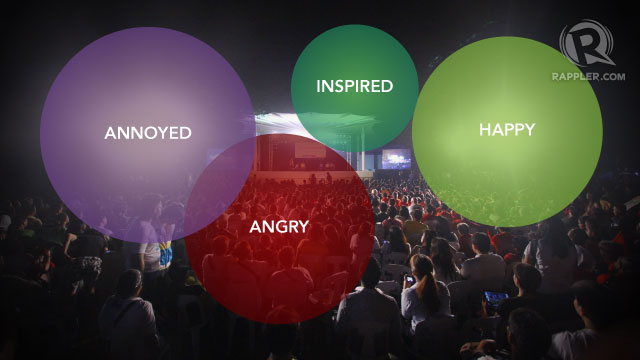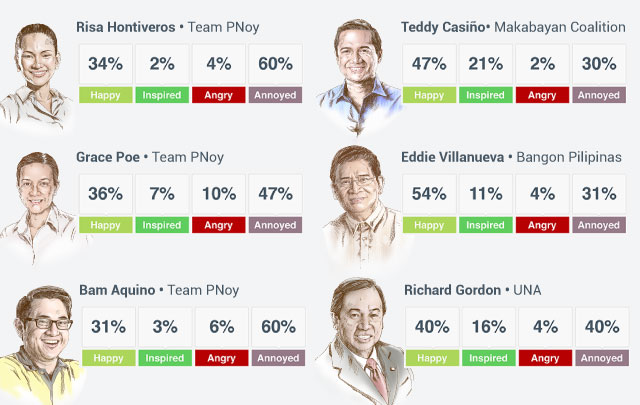SUMMARY
This is AI generated summarization, which may have errors. For context, always refer to the full article.

MANILA, Philippines – Imagine being told to your face just how annoyed or inspired you make people, by the percentage point.
Add a nearly empty stage. A lone political rival stands at the opposite end. And, from below the platform, one thousand sets of gaping eyes wait and watch.
This was the reality that 6 senatorial hopefuls braved at the Rappler debate, as reactions to their performance flashed to them and the public at the same instant.
Grace Poe called the set-up “nerve-racking,” Risa Hontiveros compared it to a public job interview and Bam Aquino joked he was nervous about annoying someone other than his wife.
Voters were merciless, and the results of Rappler’s live online poll were blunt and swift. Two candidates came out on top with the highest number of happy votes.
The highest percentage of happy votes for an overall performance was earned by Brother Eddie Villanueva, founder and leader of the religious group, Jesus Is Lord Movement. In terms of the absolute number of votes, Independent senatorial candidate Teddy Casiño trumped him, receiving 3 times the number of happy votes that Villanueva did and 24.6% more than his closest runner-up, Risa Hontiveros.
The responses were tallied in a live online poll that started at 7pm on April 13, when the debate kicked off, and closed at 9:20 pm, when the debate ended.
The poll was inspired by Rappler’s patented Mood Meter and anyone with an Internet enabled device was allowed to participate. “Interactivity has been there already (in Philippine debates) but here we focused on how people felt,” explained Rappler technology head Gemma B. Mendoza.
Voters selected one of 4 emotions – angry, annoyed, happy and inspired – and rated candidates on different segments of their 18 minutes allotted speaking time.
The aggregated results below show how voters felt overall about the debate performances of the 6 senatorial hopefuls.

Annoyed with Team PNoy?
The 3 Team PNoy bets received the greatest percentage of annoyed votes in the Rappler poll.
Risa Hontiveros, a co-author of the Reproductive Health bill, tied with presidential cousin Bam Aquino for the highest percentage of annoyed votes, a whopping 60%. They were tailed by the adopted daughter of the late, beloved film star Fernando Poe Jr., Grace Poe, who had 47% of her overall votes register as annoyed.
Those who saw Team PNoy candidates dominate the recent Social Weather Stations survey may have been scratching their heads at the Rappler results. In that tally Casiño was a distant 24, below all 3 of the Team PNoy bets who participated in the debate.
But the overwhelming positive support for Casiño isn’t very surprising when one considers the online nature of the poll. He has focused on growing an online community and was able to mobilize it during the debate.
Hontiveros also received a sizable chunk of the social media votes but her positive responses were not enough to match up to her debate partner Casiño’s. Separately, Hontiveros and Casiño raked in about 5 times as many votes as every one of the other candidates.
Monitoring the hashtag #RapplerDebate, one can see the social media support for Casiño right out of the gate. Some Casiño followers took to Twitter voting their support at 7pm, when the polls opened, even before the candidate opened his mouth.
In the past Casiño has explained that he needs the internet to help spread his campaign message because he doesn’t have the money to buy television ads. Since he couldn’t battle it out on the airwaves with the better funded party machines, he was forced to resort to bringing his fight for the senate online.
“Candidates are used to mobilizing people on the ground, but this is the first time their ability to mobilize supporters online was tested real-time,” said Rappler CEO Maria Ressa.
Rappler’s technology head added that there are mechanisms in place to make it purposefully difficult for anyone who wanted to artificially inflate the responses.
Taking the temperature
The live results were in-your-face, immediate, and at times uncomfortable to watch. But the questions is, will they make a difference?
Not in the long run, said Ressa, but the poll could help candidates change their approach before the nationwide vote in May.
“It’s like taking your body temperature. If you find out you have a fever you take medicine. If they find out that what they’re doing isn’t working with those who are supposed to vote for them, they still have time to change,” said Ressa. “It’s a snapshot of how people felt at a moment in time.”
Which is exactly what people will do a month from now when they vote in the country Gallup called the most emotional in the world. The results of the online world didn’t match reality in the 2010 presidential elections, but technology and social media are expected to play a larger role today, leading up to presidential polls in 2016.
For candidates who felt sick over their results, the diagnosis may be to fix their social media diets and beef up their online strategies.– Rappler.com
Related Stories:
- IN PHOTOS: #RapplerDebate
- #RapplerDebate and the ‘nerve-racking’ mood meter
- #RapplerDebate trends worldwide
- #RapplerDebate bets: Why vote for me?
- Hontiveros: Teen moms dying without RH law
- Poe defends FPJ’s ‘lack of political experience’
- Gordon: I’ve got qualifications, not just inherited name
- Villanueva: All religions should be equal
- Bam: PH not perfect under Aquino, but…
- El Shaddai confirms support for 6 bets
- Gordon: You want ‘bobo’ for new nat’l anthem?
- ‘Betrayed’ Bam wants his ex-boss Arroyo in court
- Hontiveros to Casiño: Why mum on NPA abuses
- #RapplerDebate: The social media campaign trail
- Click on your emotions in the #RapplerDebate mood meter
Add a comment
How does this make you feel?
There are no comments yet. Add your comment to start the conversation.